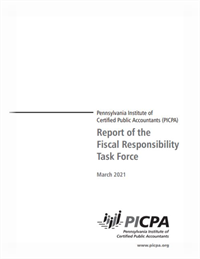CPAs Offer Financial Policy Options to Pennsylvania Lawmakers
CPAs have extensive experience helping clients meet their fiscal challenges head-on and directing them toward success. Pennsylvania, too, faces fiscal challenge, and the PICPA's Fiscal Responsibility Task Force has developed a report to assist those in governance find a sound financial footing for the state's financial health.

 By Peter Calcara, PICPA vice president - government relations, and Alex Fabian, PICPA government relations manager
By Peter Calcara, PICPA vice president - government relations, and Alex Fabian, PICPA government relations manager
Pennsylvania is in the midst of significant, long-term fiscal challenges brought on by the COVID-19 pandemic, not unlike the financial difficulties posed by the Great Recession in 2009 and 2010. In 2010, as the state was struggling to emerge from the financial crisis, PICPA Council established the Fiscal Responsibility Task Force to provide objective, nonpartisan analysis and public policy options from CPAs to help Pennsylvania’s decision makers address the state’s fiscal challenges. In late 2020, with the Pennsylvania General Assembly grappling with a significant budget deficit, the PICPA task force reconvened.
Suzanne Leighton, CPA, who chairs the Fiscal Responsibility Task Force, noted, “CPAs are uniquely qualified to assist the Wolf administration and the General Assembly with meeting the fiscal challenges that lie ahead because of COVID and the shutdowns. We routinely face the challenge of developing strategic plans of action to return businesses or clients to sound financial footing. The task force is an excellent platform to discuss a range of challenges and opportunities and offer suggestions to improve Pennsylvania’s long-term financial health.”
 In addition to chairing the task force, Leighton also spearheaded its state taxation working group. Under this area, the task force provides analysis and commentary on Pennsylvania’s three major areas of taxation—personal income, corporate income, and sales. Economic nexus, the sourcing of sales of services, addbacks, and combined reporting are also examined. This section of the report also includes a discussion of local taxes, credits and incentives, and adult-use marijuana.
In addition to chairing the task force, Leighton also spearheaded its state taxation working group. Under this area, the task force provides analysis and commentary on Pennsylvania’s three major areas of taxation—personal income, corporate income, and sales. Economic nexus, the sourcing of sales of services, addbacks, and combined reporting are also examined. This section of the report also includes a discussion of local taxes, credits and incentives, and adult-use marijuana.
With combined federal and state contributions of $44.7 billion for 2020-2021, the Pennsylvania Department of Human Services (DHS) represents the largest portion of the state budget, and is the second section of the report. Cindy Bergvall, CPA, led the task force’s DHS working group. She explains that “the functionality and operations of the DHS are important to CPAs because we depend on data to inform decisions and advance the goals of entities that receive funding for the department.”
To assist in the areas of efficiency and responsiveness, the DHS working group focused on two specific areas: studies and reports and provider efficiencies. In the first case, the task force recommended that the DHS take more time to respond to and address existing reports before embarking on new studies. In the second area of focus, the task force compiled recommendations from clients who are nonprofit providers of services related to DHS. These recommendations could add administrative and service delivery efficiencies so more energy can be focused on program impact.
The third area of the report examines Pennsylvania’s public education system. “School district consolidation is too political and virtually a nonstarter in Harrisburg,” said Cheri Freeh, CPA, who led this working group. “Our focus was on what is doable from a legislative standpoint. Many of the policy recommendations the task force puts forth in this report can be implemented with little or no effect on local school board control and would have little perceivable impact on individual school identities, students, and teachers.”
Policy recommendations in this area include consolidation of administrative functions, evaluation of the cost of mandates and regulatory burdens placed on schools, and exploration of the use of Pennsylvania’s 29 intermediate units to provide cost-effective, management-efficient programs.
In addition to Leighton, Bergvall, and Freeh, the PICPA thanks all the other members of the task force: James Baker, CPA, Timothy Billow, CPA, William Lazor, CPA, Jim Newhard, CPA, Charles Potter, CPA, Dan Schulder, CPA, Jason Skrinak, CPA, Jeffrey Spengler, CPA, Drew VandenBrul, CPA, and R. Charles Warring, CPA.
Leighton, Bergvall, and Freeh presented the findings of the report to the Tax Modernization and Reform Subcommittee of the Pennsylvania House Finance Committee on March 9, 2021. Copies of the report have been provided to Gov. Tom Wolf and all members of the General Assembly.
This marks the task force’s fifth report.
PICPA Staff Contributors
Disclaimer
Statements of fact and opinion are the authors’ responsibility alone and do not imply an opinion on the part of PICPA officers or members. The information contained in herein does not constitute accounting, legal, or professional advice. For professional advice, please engage or consult a qualified professional.






